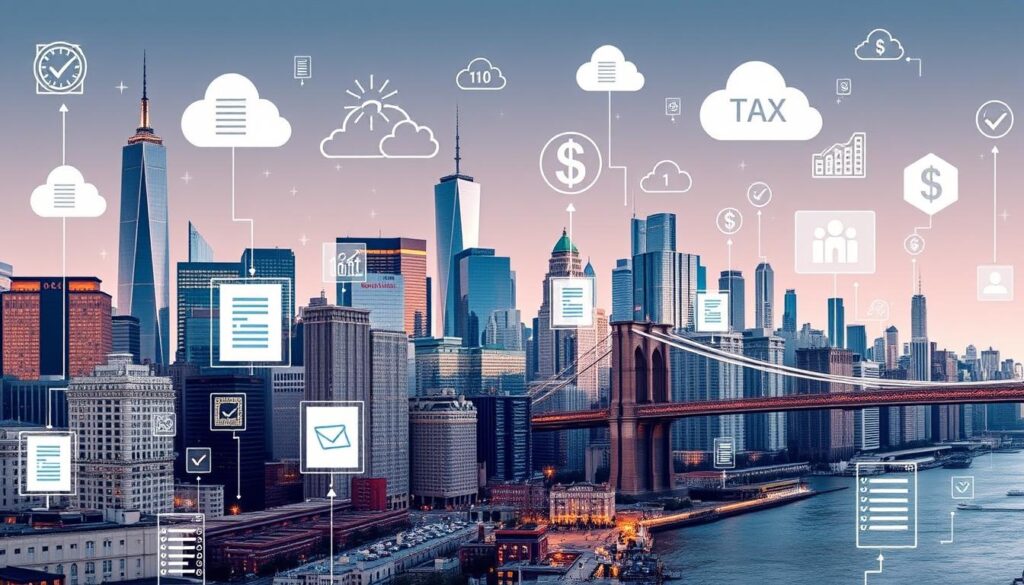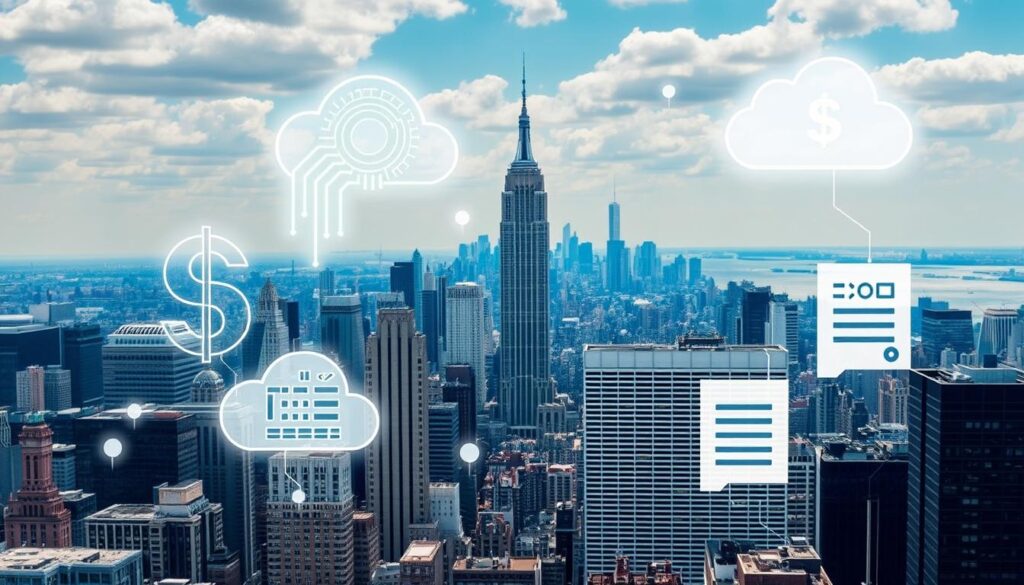Businesses offering Software-as-a-Service (SaaS) in New York need to know it’s taxed. The state charges a 4% sales and use tax on SaaS and tangible software. Local taxes can also apply, changing by area. It’s key for companies to grasp digital services tax in New York to stay compliant and avoid fines.
New York taxes SaaS and cloud services but not most digital goods. Companies selling SaaS in New York must get a sales tax permit. They must also collect taxes from customers based on where the customer is, not where the seller is. Not paying the collected sales tax can lead to penalties and interest.
This guide will cover SaaS taxation in New York in detail. We’ll look at what SaaS means for taxes, how New York taxes digital services, and the tax rates and areas. Knowing these rules helps businesses stay compliant and avoid issues.
1. Understanding SaaS Taxation in New York State
More businesses in New York are using cloud-based software. It’s key to know the state’s SaaS tax laws. New York sees SaaS as tangible personal property for tax reasons. Even though the state hasn’t officially defined SaaS, the Department of Taxation and Finance says remote software is taxed.
New York’s Approach to Digital Services Taxation
New York taxes SaaS sales tax and other digital services. The state charges a 4.0% sales tax on SaaS and digital services. This tax applies whether the software is downloaded or accessed online.
General Tax Rates and Jurisdictions
Businesses in New York also face local sales taxes that change by location. The total sales tax can be between 0% and 5%, depending on where you are. This makes SaaS tax compliance in New York quite complex.

Knowing the details of New York SaaS tax laws helps businesses. They can then correctly calculate, collect, and pay sales taxes. This avoids penalties and fines for not following the rules.
2. Is SaaS Taxable in New York: Comprehensive Overview
New York treats SaaS as tangible personal property, making it taxable. This means SaaS providers in New York must follow the new york state saas tax rules. They also need to meet their saas tax obligations new york.
The state’s rules say prewritten computer software, like SaaS, is taxed. This applies whether it’s delivered physically, electronically, or through remote access. But, custom software made for a specific buyer is usually not taxed.
Modifications to prewritten software are taxed, but extra charges for these changes might not be. Also, many software services are not taxed if they’re priced right and stated separately. Yet, software maintenance agreements with both taxable and non-taxable parts might be fully taxed.
The rules for taxing saas in new york are changing. It’s key for SaaS businesses in the state to keep up with these changes. Knowing the new york state saas tax rules well helps SaaS companies meet their saas tax obligations new york without trouble.

SaaS businesses should talk to tax experts to handle their sales tax in New York right. This way, they can use any tax breaks or credits they’re eligible for. Being proactive about tax compliance helps avoid fines and keeps SaaS companies successful in New York.
3. New York Sales Tax Nexus Requirements for SaaS Companies
For Software as a Service (SaaS) companies, understanding New York’s sales tax can be tough. Knowing when you must collect and pay sales tax is key to following the state’s tax rules. In New York, SaaS companies must meet two main tests: having a physical presence and showing economic activity.
Physical Presence Nexus Criteria
A physical presence in New York means having a real place like an office or store. It also includes using sales reps or contractors in the state. This can make a SaaS company have a physical presence nexus.
Economic Nexus Thresholds
New York also looks at how much a company sells and does in the state. If a business makes over $500,000 in sales and has more than 100 transactions in New York in four quarters, it must collect sales tax. This is called an economic nexus.
Registration and Compliance Requirements
If a SaaS company meets the nexus tests in New York, it must get a sales tax permit. It also needs to collect sales tax and file returns. How often you file depends on how much you sell.
It’s vital for SaaS companies to understand New York’s sales tax rules. This helps them avoid penalties and audits. By knowing the rules, they can handle is saas taxable in new york, saas tax new york, and new york saas tax laws well.
4. Distinguishing Between Taxable and Non-Taxable Software Services
In New York, the tax rules for software services vary. Prewritten software, seen as tangible personal property, faces sales tax. But custom software, made to fit a buyer’s needs, is usually tax-free.
For SaaS, or software as a service, New York sees it as taxable prewritten software. This means SaaS subscriptions are taxed at the state and local level. taxability of saas new york Yet, some services like training and consulting might not be taxed if they’re priced right and clearly stated.
Software upgrades in New York are mostly taxable. software as a service taxation new york But if an upgrade is made just for one buyer, it’s seen as custom and tax-free.
Where the user is located also matters. new york state saas tax rules If they’re in New York, the software license sale is taxed, even if the software is hosted elsewhere.
Businesses need to grasp these details to follow New York’s sales tax rules. This helps avoid penalties or audits.
5. Sales Tax Compliance and Reporting Obligations
For SaaS companies in New York, dealing with sales tax can be tough. But, it’s key to follow the rules to avoid big fines and keep your business running smoothly.
Sales Tax Registration Process
If your SaaS company has a presence in New York, you need to get a sales tax permit. You’ll need to give out your business details like name, address, and tax ID. You might also need to register with other state agencies depending on what you do.
Filing Requirements and Deadlines
- In New York, SaaS companies must collect sales tax and file returns. This can be monthly, quarterly, or yearly, based on how much you sell.
- When you file, you’ll report your sales, taxable sales, and the sales tax you’ve collected.
- It’s important to pay the sales tax on time to avoid fines and interest. These can be up to 10% of the tax you didn’t report, plus an extra 1% for each month late, up to 30%.
Record Keeping Best Practices
- Keep detailed records of your sales, including any sales that are tax-exempt.
- Track the sales tax you collect from customers and make sure to send it to the state on time.
- Keep up with any changes in New York’s sales tax laws and rules to stay compliant.
By sticking to these guidelines, SaaS companies can handle saas tax compliance new york, saas sales tax new york, and saas tax obligations new york well. This way, they can avoid penalties and keep their business running smoothly.
Conclusion
The tax rules for SaaS in New York State are complex and changing. The New York State Department of Taxation and Finance says SaaS is taxable. This is because it’s seen as tangible personal property, subject to sales and use taxes.
However, the department’s latest on IaaS shows a possible mismatch in taxing cloud services. This could mean different rules for different types of cloud services.
Companies offering SaaS in New York need to know their tax status. They must register for sales tax permits and follow tax rules. SaaS and prewritten software are usually taxed, but custom software and some services might not be.
It’s key for SaaS providers in New York to keep up with the state’s rules. This includes knowing about digital products, software maintenance, and remote access. This knowledge helps them avoid fines and penalties.
Getting advice from tax experts who know New York’s sales tax laws is a good idea. They can help SaaS companies understand and follow the rules. This ensures they stay compliant and meet their tax duties.
FAQ
Is SaaS taxable in New York?
Yes, SaaS is taxable in New York. Businesses offering SaaS in the state must collect and pay sales taxes on their sales.
How does New York define SaaS for tax purposes?
New York views SaaS as tangible personal property for tax purposes. The state doesn’t have a specific definition for SaaS in its laws. But, the Department of Taxation and Finance has said that software accessed remotely is taxable.
What is New York’s approach to digital services taxation?
New York taxes prewritten computer software, including SaaS, no matter how it’s delivered. Custom software made for a specific buyer is exempt. But, if sold to others, it’s taxable.
What are the sales tax rates for SaaS in New York?
The state sales tax rate for SaaS and other digital services in New York is 4%. Local taxes can add to this, making rates vary by location.
What are the nexus requirements for SaaS companies in New York?
New York considers a business to have nexus if it has a physical presence or meets economic activity thresholds. Physical presence includes having an office or employing people in the state. Economic nexus is met by 0,000 in sales and 100 transactions in the state.
What types of software services are exempt from sales tax in New York?
Custom software is exempt in New York. Certain software-related services are also exempt if they are separately stated and reasonably priced. These include training, consulting, and maintenance. Software upgrades are taxable unless made for a specific buyer.
What are the sales tax compliance and reporting obligations for SaaS companies in New York?
SaaS companies with nexus in New York must register for a sales tax permit. They must collect sales tax and file returns, which can be monthly, quarterly, or annually. It’s important to pay sales tax on time to avoid penalties and interest.


